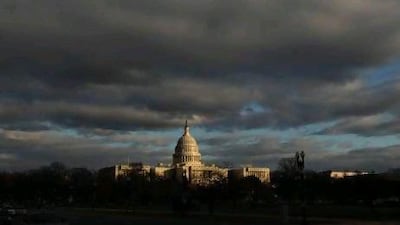WASHINGTON // On February 17, Amine El Khalifi strapped on a belt of explosives, grabbed a gun, said goodbye to two companions and headed for the US Capitol building.
The 29-year-old Moroccan was allegedly determined to cause as much damage as possible. But he was arrested before he left a parking garage. His "weapons" had been rendered inoperable. One companion was an undercover agent with the Federal Bureau of Investigation. The other was a paid informer.
Mr El Khalifi's intentions seem clear, and he is currently in prison awaiting trial.
But the question of whether the US government engaged in entrapment - inducing someone to commit a crime he would otherwise not have committed - hovers over cases such as his.
Rather than looking for real plots being hatched, critics say, the FBI is targeting the weak and vulnerable, often in America's Muslim communities. Sometimes those efforts are led by informers, some receiving as much as US$100,000 (Dh367,000) for their efforts.
There have been more than 500 terrorism-related cases in the US since September 11, 2001, according to an investigation by Mother Jones, a liberal magazine. But 150 of them involved sting operations with government agents or paid informers providing some inducement to the alleged terrorist. The cases include plots to bomb the Washington subway system, the New York City subway, the Sears Towers in Chicago, a Christmas tree lighting ceremony in Portland, Oregon, as well as Jewish institutions and military installations across the country.
It is, according to James Wedick, a former FBI agent, "bureau theatre". The FBI, he said, is providing "foolhardy people" all the necessary tools to become bombers and "calling that a case and telling the American public they should feel safe now".
Mr Wedick, who has served as a consultant for the defence in several of these cases, criticised the heavy reliance on paid informants.
A case in point is the Liberty City Seven case in Florida, he said. Seven men of African-American or Haitian origin, who were members of a small religious group, allegedly plotted to blow up the Sears Tower. Five were convicted and a key piece of evidence was a recording of an oath of allegiance they made to Al Qaeda. The ceremony was led by Elie Assad, a veteran FBI informer with a criminal past. He was paid US$80,000 and another informant was paid $40,000 by the government.
"Since September 11 it's almost as if the bureau has lost its mind," said Mr Wedick. "We didn't do that before. We didn't send informants into neighbourhoods, looking for people who might be annoyed and then suggest they could become a bomber."
But claiming entrapment is rarely successful as a legal defence. Defendants rest their case on convincing a jury that they would not have committed the offence without the intervention of law enforcement, which is "extremely difficult" to do, said David Cole, a law professor at Georgetown University in Washington.
The bigger the crime, he said, the harder it is to successfully claim entrapment.
"If you think what you are strapping is a suicide bomb to yourself and you go out to do something, it's hard to persuade a jury that you weren't pre-disposed."
The FBI rejected a request for an interview. But an official responded via email said "all undercover operations involve extensive legal reviews … to guard against the possibility of entrapment".
"Whenever an individual expresses a willingness to commit violence and refuses to back down, the government has an obligation to take it seriously," the official added.
Mr Cole said law enforcement agencies were under "tremendous pressure" to prevent incidents. But the sheer number of such cases implied, he said, either "very good police work" or "crime that would never have occurred had the government not induced it. I'm confident that in some instances that's the case."
Andrea Prasow, the senior counter-terrorism counsel with Human Rights Watch, said the real issue is how targets are selected.
"Are they actually going after people who they believe are going to commit crimes? Or are they finding people who are angry and providing the impetus, assistance, support for such an attack? And are they doing so based on race or religion?"
Mr Khalifi reportedly began frequenting mosques in Northern Virginia, in the Washington suburbs in 2008. An illegal immigrant in the US since 1999, he came to the notice of an informer in January 2011 when, according to the criminal complaint filed against him, he agreed with the statement that the "war on terror" was really a war on Islam.
Mr Khalifi was later introduced to an undercover agent to discuss possible terror plots. He at first rejected a suggestion to target an office building because of the presence of civilians. He also eventually refused to record a "martyr" video. He did not, he told the undercover agent, want anyone to know who did it.
In general, Mr Wedick said he believed only a handful of the sting operations since 2001 were "real terrorism cases". One day, he said, "the bureau will see that these cases are at least unethical, and may be illegal".

